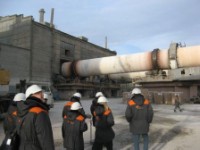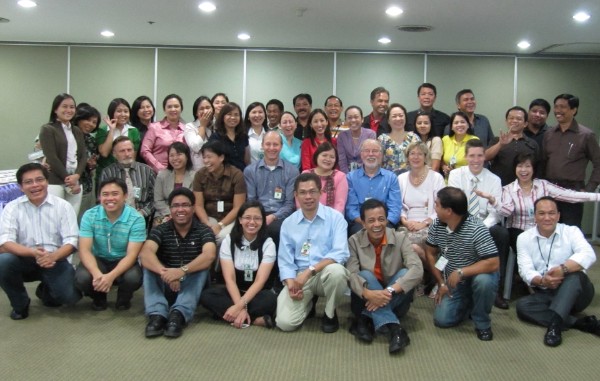|  |  |  |  |
ProjectsWe handle national and international projects related to sustainability. Our grants come from Developmentbanks, industries, nature conservation organisations or municipalities.
- We support a project of the WWF Germany, where the Russian banks are encouraged to take into account self-committed sustainability issues into their project financing, see "Pure Profit for Russia: Benefits of Responsible Finance". The report provides an overview of the evolution of international mechanisms of environmental and social responsibility in the global financial sector, quantifies the scope of exposure of foreign and Russian financial institutions to environment-intensive sectors of the Russian economy, and concludes with recommendations regarding actions that might be implemented by both the Russian government and domestic financial institutions.
 - We have developed a credit-program proposal for GTZ and KfW for a project of the Housing Initiative for Eastern Europe (IWO) e.V. for energy efficiency investments for the building stock in Romania.
- For a cement plant in Russia, which is to be modernized, we have conducted an independent assessment according to the Equator Principles. The Equator Principles provide procedures and rules for assessing the environmental and social effects of direct project finance.
- We have advised Chinese, Indian and Philippine banks in setting up lines of credit with which energy efficiency investments will be
promoted in industries and buildings. - We advise on the implementation of the European Chemicals Act REACH. This enactment requires the appraisal and registration of all chemical contamination with a complete declaration of relevant environmental and hygenically meaningful information.
- We deal with growth changes of European woody plants and the use of data for monitoring climate change.
- Mexico: Together with the GiZ and GOPA, Bad Homburg, and the Passive House Institute, Darmstadt, and Thomas Reuters Point Carbon we have prepared a strategy for Mexico for very energy efficient new residential buildings. One key aspect of this strategy is the implementation of the world’s first Nationally Appropriate Mitigation Action (NAMA) in the housing sector, which will increase the penetration of energy efficient appliances and building design, and permit technology up-scaling to make new homes increasingly energy efficient as the program develops. The NAMA has been presented at the Durban conference by the Mexican government in December 2011.
- http://www.conavi.gob.mx/documentos/publicaciones/4_Supported_NAMA_for_Sustainable_Housing_in_Mexico.pdf
- We have developed guidelines for the appraisal of mini hydro power projects, solar power projects, wind power projects and biomass gasification projects.
 Projekte Wir bearbeiten nationale und internationale Projekte zum Thema Nachhaltigkeit. Unsere Aufträge erhalten wir von Entwicklungsbanken, aus der Wirtschaft, von Naturschutzverbänden oder auch von Kommunen.
Wir unterstützen ein Projekt des WWF Deutschland, in dem russische Banken dazu bewegt werden sollen, durch Selbstverpflichtungen Nachhaltigkeitsfragen bei ihren Projektfinanzierungen zu berücksichtigen, siehe "Pure Profit for Russia: Benefits of Responsible Finance" Für ein Projekt der Initiative Wohnungswirtschaft Osteuropa (IWO) e.V. zur thermischen Sanierung von Plattenbauten in Rumänien haben wir für die GTZ und die KfW Vorschläge f ür ein Kreditprogramm entwickelt. Für ein Zementwerk in Russland, das modernisiert werden soll, haben wir eine unabhängige Begutachtung nach den Äquator-Prinzipien durchgeführt. Die Äquator Prinzipien stellen Verfahren und Regeln für die Beurteilung der Umwelt- und sozialen Wirkungen von direkten Projektfinanzierungen dar. Wir haben chinesische, indische und philippinische Banken bei der Einrichtung von Kreditlinien beraten, mit denen Energieeffizienzinvestitionen in Gebäuden und in Industriebetrieben gefördert werden. Wir beraten bei der Umsetzung der Europäischen Chemikalienverordnung REACH. Diese Verordnung verlangt für die Überprüfung und Anmeldung aller chemischen "Altstoffe" die lückenlose Angabe umweltrelevanter und arbeitshygienisch bedeutsamer Daten. Wir befassen uns mit Wachstumsänderungen europäischer Holzgewächse und der Nutzung der Daten zu Dokumentation des Klimawandels. Wir haben uns an der Erarbeitung eines Vorschlags für den Landrat des Hochtaunuskreises zur Berichterstattung zu Nachhaltigkeitsfragen beteiligt. Hier sind wir zusammen mit dem BUND Kreisverband Hochtaunus tätig. Mexiko: Zusammen mit der GiZ, der GOPA und dem Passivhaus Institut, sowie dem norwegischen Consultant Thomas Reuters Point Carbon haben wir für Mexiko eine nationale Strategie zur Minderung des Energiebedarfs bei neuen Wohngebäuden erstellt (eine s.g. Nationally Appropriate Mitigation Action NAMA). Diese NAMA hat die mexikanische Regierung bei der Weltklimakonferenz in Durban im Dezember 2011 präsentiert. Es ist weltweit die erste NAMA dieser Art. Die Leistungen haben wir teilweise ehrenamtlich, teilweise im direkten Auftrag für die GIZ erbracht. Die NAMA wurde im Internet veröffentlicht, siehe: http://www.conavi.gob.mx/documentos/publicaciones/4_Supported_NAMA_for_Sustainable_Housing_in_Mexico.pdf Für Entwicklungsbanken haben wir Leitfäden für die Prüfung von Kleinwasserkraftwerken, Windkraftanlagen, Solaranlagen und Biogasanlagen erstellt.

|
 |
|  |
|
|  |